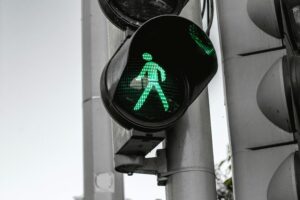What Is Fault?
Fault is when an entity intentionally or negligently fails to act reasonably, according to legal standards or one’s duty, resulting in harm to another person. This failure can arise from various factors such as ignorance, carelessness, negligence, or a lack of skill. If actions like not being aware, not taking proper precautions, disregarding others, or lacking necessary skills lead to injury to another person, they can all be considered as fault.
Legal scholar John C. Jeffries Jr. states, “Fault is the linchpin of tort liability.” Fault plays a crucial role in various aspects of law, including tort law (civil wrongs), contract disputes, and criminal law. Establishing fault is essential in legal proceedings to determine liability and to assess damages or penalties accordingly.
Fault forms the basis for legal liability and compensation. For example, in a car accident case, fault may be assigned based on factors like speeding, failure to yield, or distracted driving. For plaintiffs seeking damages, proving fault is essential to demonstrate that the defendant’s actions or negligence directly caused their injuries or losses. Conversely, defendants may argue mitigating circumstances or lack of fault to defend against legal claims.
More information about Fault
Pedestrian Struck on Interstate 95 in South Philadelphia
A pedestrian was struck and killed while walking along Interstate 95 in South Philadelphia on December 10. According to news reports, the pedestrian was walking on the highway for unknown reasons around 11 pm when he was hit by a vehicle. The pedestrian was pronounced dead at the scene.
I-95 southbound was closed for several hours between I-676 east and Market Street exits.
Our thoughts are with the victim’s family.
Pedestrian Accidents Increase During the Nighttime
According to recent data from the Federal Highway Administration, 76 percent of pedestrian fatalities occur at night, despite lower pedestrian activity during these hours. Some of the common reasons why nighttime pedestrian accidents are so dangerous include:
- Limited Visibility: Judging distances and speeds in low-light conditions can be difficult. Shadows and the glare from oncoming headlines can obscure the pedestrian from the driver. […]
More information about Fault
What Does a Wrongful Death Lawyer Do?

A wrongful death attorney helps families file their claims and build strong cases. They work diligently to gather evidence and establish who was at fault. They also fight to secure fair compensation for the family’s devastating losses. The process involves a thorough investigation of the death. They often bring in expert witnesses to strengthen the case. Throughout the process, they handle all negotiations with insurance companies.
Each element plays a vital role in building a compelling case to, ultimately, hold the responsible parties accountable. With a focus on both legal expertise and compassionate support, […]
Read MoreMore information about Fault
Is the Driver Always at Fault in a Pedestrian vs Car Accident?
Determining fault in pedestrian-vehicle accidents involves complex factors, as both drivers and pedestrians have specific responsibilities when using roadways. Pennsylvania’s comparative negligence law helps establish liability when both parties may share responsibility for an accident.
Understanding Fault in Pedestrian-Vehicle Accidents
Understanding road rules is critical for both drivers and pedestrians to navigate traffic situations. Drivers must yield right-of-way to pedestrians in crosswalks and be vigilant, especially in heavy traffic areas. Pedestrians must obey traffic signals, cross at designated crosswalks, and remain alert.
Pennsylvania’s Comparative Negligence Law
The law in Pennsylvania follows the approach known as comparative negligence. This means that if the pedestrian and driver are partially at fault in the event of a car accident, the damages recovered in the lawsuit may be reduced depending on the percentage of fault allocated to each. […]
Read MoreMore information about Fault
The Importance of Gathering Evidence in a Personal Injury Lawsuit
When filing a personal injury lawsuit after an accident, gathering comprehensive evidence strengthens your position and can significantly impact your compensation. While collecting evidence might seem overwhelming, an experienced personal injury attorney can guide this process, ensuring no critical details are overlooked. Multiple expert opinions and diverse forms of evidence enhance your case and help establish the facts.
Key Types of Evidence and How Your Attorney Can Help
Photographs and Video Evidence

More information about Fault
Personal Injury Claims: What to Expect
Getting hurt in an accident can turn your life upside down. Understanding how personal injury claims work will help you get the compensation you deserve while focusing on your recovery.
How Long Do Most Personal Injury Claims Take?
Most personal injury claims take four to 12 months to wrap up, though some cases might need more time. The timeline depends on how serious your injuries are, who was at fault, and whether the insurance company works with you or against you. If your case goes to court, it could take longer than if you settle outside court.
It’s smart to wait until your doctors say you’re as recovered as you’re going to get before settling. This way, you’ll know what your long-term medical needs and costs will be.
How Does the Claims Process Work?
The personal injury claims process is straightforward – […]
Read More









